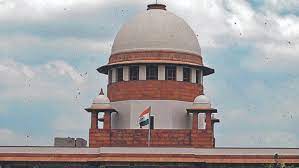(A) Penal Code, 1860, Section 302/34; Sections 304B and 498A read with Section 34 – Murder – Circumstantial evidence – Appreciation of evidence – Plea of alibi – Trial court and the High Court have basically convicted and affirmed the conviction under Section 302 IPC, finding the plea of the alibi to be without substance – Held that it is a settled proposition of law that before the burden shifts on the accused under Section 106 of the Evidence Act, the prosecution will have to prove its case – Prosecution will have to first establish that before the death occurred, the deceased and the accused were seen in the said house -Incident had occurred on the intervening night of 28th/29th May, 2004 – It was necessary for the prosecution to lead some evidence to establish that on the night of 28th/29th May 2004, deceased and accused were together in the house – This will be more necessary in view of the specific plea of the defence of alibi. (Para 11)
(B) Penal Code, 1860, Section 302/34; Sections 304B and 498A read with Section 34 – Evidence Act, 1872, Section 27 and 65A – Murder – Circumstantial evidence – Appreciation of evidence – Disclosure statement – Recovery – Prosecution has relied upon the CDRs with regard to mobile phone of the (accused No.2) and appellant (accused No.1) – However, both the Courts found the said evidence to be inadmissible as it was not proved in terms of Section 65A of the Evidence Act – The circumstances relied upon by the prosecution with regard to the seizure of the bloodstained clothes allegedly used by the appellant at the time of commission of the crime beneath the double bed from his parental home at Chandrawal cannot be relied – For a recovery to be admissible on the statement made under Section 27 of the Evidence Act, it has to be from such a place which is exclusively within the knowledge of the maker thereof – Indisputably, the recovery is from a place accessible to one and all and the recovery panchnama also does not mention the date regarding such a recovery – Apart from that, there is no entry in malkhana register with regard to the deposit of the said articles and sending them to the FSL for chemical examination – Said circumstances cannot be said to be proved beyond reasonable doubt – Apart from that, the prosecution has not been in a position to prove any other circumstance beyond reasonable doubt – Prosecution has failed to prove any incrimination circumstance beyond reasonable doubt – Appeal partly allowed – Conviction and sentence imposed upon the appellant for the offence punishable under Section 302 IPC liable to be set aside – However, the conviction and sentence in respect of the offences punishable under Sections 304B, 498A read with Section 34 IPC restored – Appellant has undergone incarceration for a period of more than fifteen years -Directed that it will not be necessary for the appellant to deposit the fine amount – The appellant is directed to be set at liberty forthwith, if not required in any other case. (Para 13, 17 and 18)
SUPREME COURT OF INDIA
2024 STPL(Web) 211 SC
[2024 INSC 211]
Ravinder Kumar Vs. State Of Nct Of Delhi
Criminal Appeal No. 918 of 2024-Decided on 06-03-2024
https://stpllaw.in/wp-content/uploads/2024/04/2024-STPLWeb-211-SC.pdf







